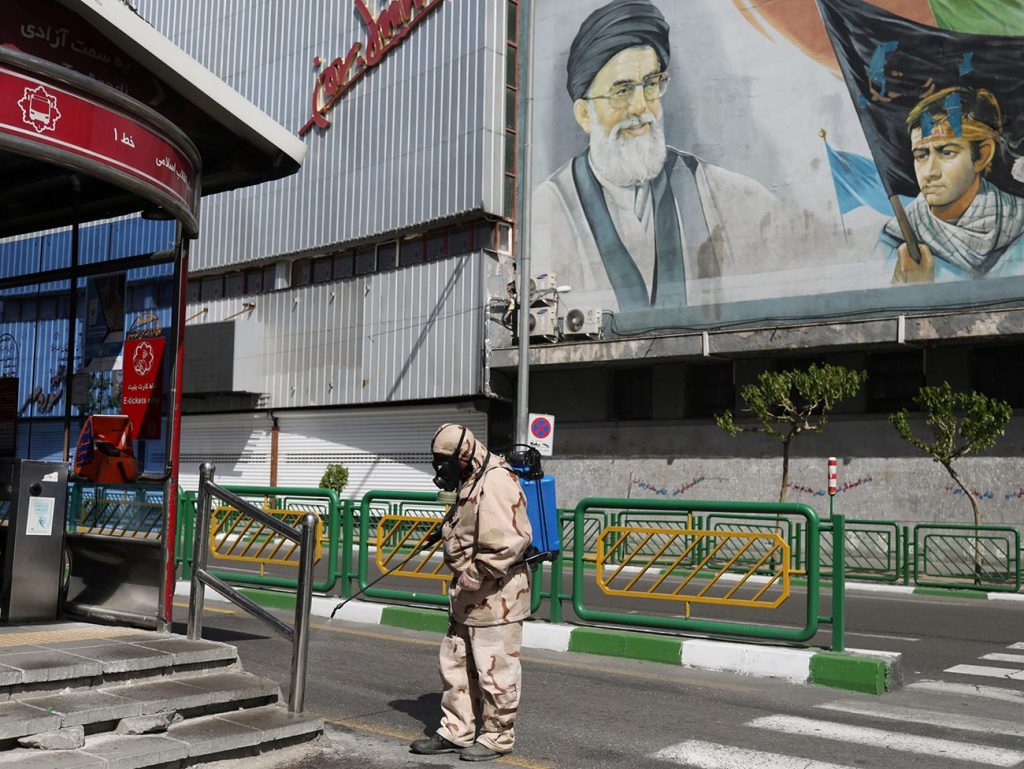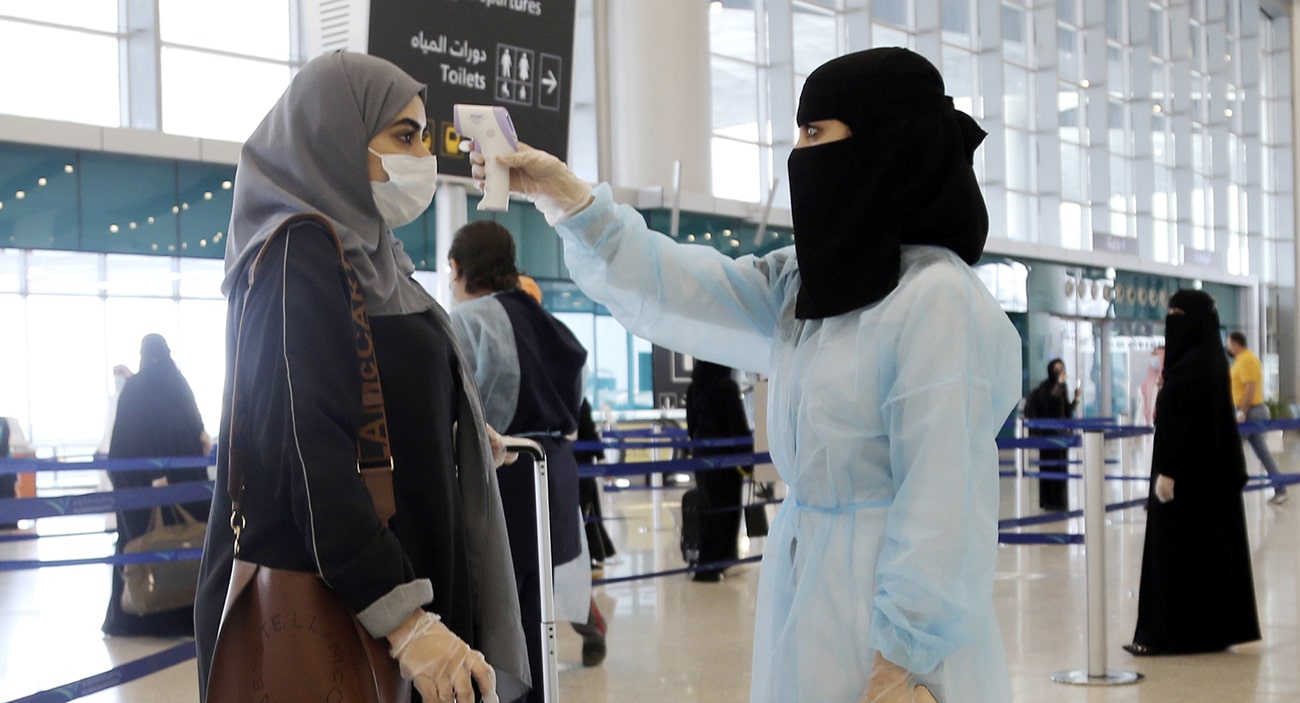Two years ago, it was easy to get the impact of the coronavirus pandemic wrong. I certainly did. While no one had much of an idea back then what course the disease would take, Middle Eastern governments in particular seemed ill-equipped to succeed. Most seemed unable to do much to halt the spread of the virus, and their economies did not show many signs of resilience. With many already in poverty and lacking formal employment, populations across the region were living on a knife’s edge. We had a good sense that COVID-19 would disrupt economies, slash incomes, and demonstrate governmental ineptitude. To me, and to others, it seemed poised to throw the region into chaos.
All these things happened, except for the last one. After two years, the pandemic has not thrown the region into chaos—at least not yet. In fact, the pandemic’s political fallout has been relatively modest everywhere around the world. If anything, the effect of COVID-19 has been to deepen political patterns rather than to shift them. Where governments in the Middle East had firm control over the populations, that control seems even firmer today. We certainly did not see a reprise of the Arab Spring, where populations united to force accountability on governments whose performance they considered to be inadequate. For communities committed to understanding political economy, global security, and the drivers of political change, the pandemic’s modest political punch in the Middle East requires explanation.
If there is a poster child for a government’s ineffective COVID-19 response in the Middle East, or almost anywhere in the world, it is Iran. It was hit early and hard by the pandemic. For many months, Iranian infection rates were among the highest in the world. Early on, Iranian officials downplayed the seriousness of the disease, and already-low public trust in government hobbled whatever response the government sought to muster. In the last two years, the country has suffered through five waves of deaths, each one larger than the last. To this day, vaccine hesitancy is high, not least because the government keeps trying to push a domestically produced vaccine, and so many Iranians distrust their government.
Iran’s economy was already reeling before COVID-19 hit, and its GDP was falling. The pandemic accelerated that decline, shrinking global oil demand and greatly reducing global energy prices. Even though Iran’s energy exports are hobbled by sanctions, the country still sells hundreds of thousands of barrels of oil per day on global markets; lower prices depressed the economy even further. Inflation began running at almost 50 %.

It would seem like a perfect storm for an unpopular government. The mistakes handling the pandemic domestically combined with the global effects of COVID-19 to compound the consequences of the government’s strategy of confrontation with the West. It could all combine to bring the whole system down.
Yet when Iran held elections last June, the population did not rally to demand a different path forward. In fact, Iranians didn’t rally much at all. The elections had record low turnout, but it didn’t mean that Iranians had become passive. Iran was roiled by protests last summer, over water and electricity shortages. The government cobbled together a response that provided some temporary relief but failed to address the systemic problem in which demand continues to outstrip supply.
Unprecedented failures by the government to control the coronavirus and a series of self-inflicted wounds that compounded public distress were not enough to get the Iranian public to demand a new leadership. Instead, the Iranian public opted to work within the existing system on longstanding grievances having to do with water and electricity, protesting as they had done before, and obtaining the same result: palliative measures that did little to address the underlying problems.
At the other end of the spectrum in the Middle East is Israel. The country was aggressive in protecting the health of Israelis, and then Prime Minister Benjamin Netanyahu made a deal with Pfizer-BioNTech to secure early vaccines for all Israelis in return for comprehensive clinical data. As a consequence of this innovative agreement, Israel was the first country in the world to vaccinate a majority of its population (and later, one of the first to mandate boosters). It provided the public with early opportunities for a return to normalcy in the spring of 2021—months before other countries—and it highlighted the effectiveness of the Israeli health system. The Israeli government response seemed a shining example of visionary deal-making and leadership competence.
Yet in Israel, too, the pandemic seemed to lack political traction. Netanyahu had won victories in three closely decided elections in the two years prior, but he narrowly lost his election in March 2021. While Netanyahu had appeared persistently vulnerable, his vulnerabilities had stayed steady, and he was able to eke out a win repeatedly. Yet at precisely the time when the biggest news in the country was Netanyahu securing vaccines and pointing a way out of the pandemic—or so Israelis thought—it did him no good.
Elsewhere, the pandemic did have more of an effect on political careers, but not on basic policies. In Japan, perceived bungled efforts to balance economic growth with the preservation of public health helped force the resignation of Prime Ministers Shinzo Abe in August 2020 and Yoshihide Suga in September 2021. At issue was public frustration that lockdowns were too harsh and that infection levels were too high—essentially, people expected superb performance from their government. The prime ministers’ departures did not change much, as their Liberal Democratic Party remained in control; the change was minor at best.
In places where politics are less open, some governments appear to have been able to turn the pandemic to their advantage. For example, the wealthier Gulf monarchies were especially proactive. They secured vaccines, mandated their administration, and pushed their publics to use smartphone apps that revealed vaccine status and user location. Those apps allowed governments to contact people, trace them, enforce bans on movement, and more generally keep close tabs on users. Meanwhile, they pumped billions of dollars of stimulus payments into their economies.
Other authoritarian governments were similarly proactive. China is the most well-known. It has pursued a “zero-COVID” strategy that has involved large-scale lockdowns when infections are present, and it has also used smartphone software to verify identity and vaccination status, as well as to control people’s movement. If there are signs of public resistance, they are not visible.
Tunisia represents a more complicated case. There, the pandemic deepened economic distress over the summer of 2021. Parliament was already under pressure. A relatively inexperienced body that had been re-imagined after the 2011 revolution, critics charged it had become a collection of preoccupied, self-interested, and self-serving politicians who were incapable of meeting the country’s challenges. Tunisia’s president, Kais Saied, seized on popular discontent to dismiss parliament and argue for a new constitution. So far, he appears to enjoy widespread popular support, presiding over a majority that had come to distrust democratic rule.
Less complicated cases are in countries that have descended into conflict. Syria, Yemen, and Libya are among the most uncertain in the region, with central governments that lack control over large swaths of their territory. In these countries, access to any kind of healthcare can be a chancy endeavor, and combatants have used access to medicine as a political instrument. Even so, evidence suggests that the health consequences of violence are greater than those of the pandemic, and the pandemic itself doesn’t seem to have shifted the balance of power or changed the nature of these conflicts.
Scanning the horizon, we see a varied picture. In mature democratic countries, there is no distinctive “COVID effect.” One could argue that Donald Trump’s lackluster coronavirus response was responsible for his defeat in November 2020, but one could claim just as firmly that Trump’s loss was a consequence of his broader approach to governing, his instinct for polarization, or his relentless use of Twitter. COVID-19 may have made the environment slightly more politicized than it has been, but not much. For example, in Europe, political polarization seemed to be in motion before the virus, and it neither seems to have halted nor accelerated that movement. Boris Johnson’s current political problems may stem more from how his inner circle handled the coronavirus than how his government handled the country. Despite the fact that COVID-19 has touched the lives of everyone in these countries, their politics have proven too complicated and too interwoven to center around the pandemic Although COVID-19 may have driven disaffection, it is harder to see what the public want from their governments in absolute terms. Instead, what democratic societies seem to want is generally defined in relative terms, namely that they want things to be relatively better than they are.
COVID-19 also appears to be a relatively impotent force in less democratic spaces as well. In the Middle East, a certain sense of fatalism among the public—perhaps inflected by religious belief—can be added to the frustration felt that the efforts of 2011 to enact political change had backfired. The often-lackluster performance of Western governments, which in many cases proved unable to stanch their own waves of infections, surely reduced expectations that developing country governments could do better than they did.
But the pandemic also suggests that authoritarian governments still have a number of tricks up their sleeves. While central bankers helped to keep economies afloat amid diminishing economic activity, security services and information ministries worked overtime. It is becoming clearer that identity—be it sectarian, religious, or national—can be constantly reinvented, and people remain receptive to calls to rally in the face of threats. In the face of the pandemic, authoritarian governments became more outspoken about their enemies, and citizens are wary of being seen in opposition. Security services have also grown more sophisticated and more skilled.
Although it seemed that the Middle East came together a decade ago driven by utopian visions of the Arab Spring, often united against governments, now, governments appear to have grown more skillful at holding their countries together, feeding on fears of what might be. They appear to be bringing their publics along. While the strategy may serve governmental interests in the near term, it is hard to see it serving public interests in the longer term.

